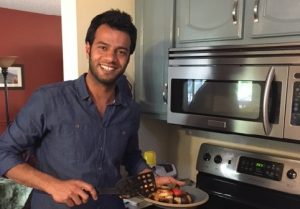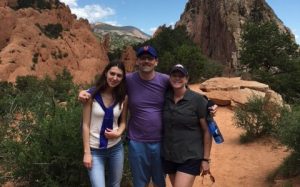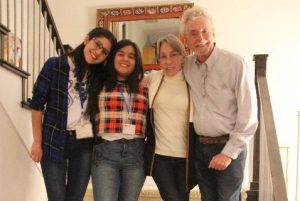-
What We Do
- WHERE WE WORK
-
About Us
 Welcome Message from Carol Jenkins
Welcome Message from Carol JenkinsFor more than 90 years, World Learning has equipped individuals and institutions to address the world’s most pressing problems. We believe that, working together with our partners, we can change this world for the better.
On my travels, I’ve had the opportunity to meet with many of those who have joined us in this mission. In Baghdad, we’ve trained more than 2,300 Iraqi youth who are already giving back at home. In London, our partners in the TAAP Initiative strongly believe that we are all responsible to practice inclusion. And in Vermont, our Experiment in International Living and School for International Training participants prove every day that they have the tools and the determination to change the world.
Please join us in our pursuit of a more peaceful and just world.
- Get Involved
Media Center > Story
How International Exchanges Have Made a Difference in Denver
September 13, 2017
Denver may be known as the “mile-high” city for its mountainous perch, but it’s also a beacon that attracts people from countries around the world. A thriving center of international exchange programs, the city and state contribute significantly to citizen diplomacy, which sheds a favorable light on the community and the country, helps local businesses connect with global opportunities, and generates lasting friendships.
The goals put simply: “Achieving peace and creating connections, one person, one community at a time,” said Alyssa Fox, a homestay manager for Sister Cities International, in a February 2017 Associated Press article.
Each year, Colorado hosts more than 500 international leaders, professionals and students, providing more than 3,700 cross-cultural engagements, with local citizens volunteering more than 20,000 hours of service, according to a recent report from Global Ties U.S., a Washington, D.C.-based non-profit.
At the same time, exchange programs hosted in Denver have generated about $1.5 million in annual revenue from hotels, transportation, food and entertainment,” says Gergana Kostadinova, the manager for professional and youth programs at World Denver, a community organization dedicated to advancing an understanding of global affairs and cultures.
Many visitors come through State Department-funded exchange programs, which are designed and implemented by World Learning, a nonprofit that oversees exchanges around the world. The organization taps its network of local partners, like World Denver, to find host families in the U.S. (more than 2,000 visitors a year) and carry out local programs.
“In addition to hosting students from countries like Iraq, China and Mexico, we also connect visiting entrepreneurs to local companies and non-profits to plant the seeds for business partnerships,” says Gergana. “These connections go way beyond a nice dinner.”
For example, young business and social entrepreneurs from Latin America and the Caribbean recently visited Denver for five weeks to meet with, network, learn from and volunteer at local organizations. After another exchange, Russian entrepreneurs invited three Denver business consultants to their country to conduct trainings on subjects ranging from marketing strategies to women’s issues, Gergana explains.
Another program organized reciprocal visits (sponsored by the U.S. Embassy in London) for community leaders from Denver and Birmingham, England, to exchange information on and promote tolerance, safety, security and cultural understanding, as well as techniques to prevent radicalization, in their communities.
Breaking down stereotypes
One of the great advantages for local hosts, who provide a home to visitors for days or weeks at a time, is to learn about the different perspectives of their guests and to break down stereotypes.

Carey Sacks hosted several visitors through World Denver, including teenage girls from Iraq and Chile and a young businesswoman from Russia. In addition to providing family dinners, a warm bed and sightseeing opportunities, Carey has cooked favorite foods with her guests, taken them horseback riding and even created a mock Halloween party in August because her Iraqi visitor, Aya, only knew about the holiday from television.
Aya, who wants to become a dentist to help the people of her country, lost her brother to an American bomb attack in Baghdad. “Her family was brave to send her here because they were afraid of Americans, and I wanted to show them how welcoming we can be and how cool our country is,” Carey explains. “Relationships matter.”
Paula Schriefer and her family have also hosted students from the Middle East. She says “we all genuinely grew to love each other. We hosted two Iraqi students, one a Shia, the other a Sunni, and they really bonded, too. We were all saddened when they had to depart.
“It’s an eye-opening experience for everyone, and its fun,” adds Paula, who heads the Spring Institute, an immigrant support organization. “The kids are nervous at first, but taking people out of their comfort zone allows them to open up. For some American hosts, “it may be their first exposure to Muslims from the Middle East.”

Having worked at the State Department and lived in the former Soviet Union, Paula says “people who’ve participated in exchanges become more than friends, they become incredible allies, and you find that they generally like Americans, if not their government’s policies.”
“The kids call me mom,” says Brenda Stokes, who, with her husband Allen, has hosted students from Mexico, Chile and Argentina. After introducing one student to pancakes and another to snow for the first time, “it’s amazing how quickly stereotypes break down and we start to feel like family,” she says.
“The more people cross boundaries, the better off the world is,” Brenda explains, noting that some of the guests thought all Americans carried guns.
Seeing the U.S. through their eyes
“It’s a way to connect with the world from our front door and see our country through another’s eyes,” says Donna Bryson, a former international correspondent for the Associated Press who has hosted students with her family in Denver.
“An Iraqi student who stayed with us for two weeks was surprised to see people in wheelchairs going to work or school. Not that her own country, wracked by decades of war, doesn’t have people disabled by injury or disease. But in Baghdad, she said, they’re hidden away. She helped me see that I’d taken for granted the progress here for Americans with disabilities.”
For Susie Shanley and her family, one of her guests, an Iraqi boy, really hit it off with her teenage son and they’ve become lifelong friends. The family and their guests attended a Rockies game and a jazz festival at a nearby park, rode bikes, and visited a mosque.
Enthralled by democracy
“I’m surprised how much they taught me,” says Susie, who once worked with a refugee organization and helped a Syrian family acclimate to the U.S. “The kids were absolutely enthralled by our government and how democracy works,” she says. “They made friends easily and learned we’re not out to get them. It’s easy for us to say ‘Muslim terrorists,’ because you can’t have empathy if you’ve never had a Muslim friend, and it’s easier to dismiss them if you don’t know.”

Ralph Ogden and Anne Wilcox, who are experienced world travelers, have hosted girls from China, Argentina, Chile and Israel, as well as boys from Kurdistan — and they’ve stayed in touch with — and even visited — most of them in their home countries. In fact, the Chilean student is planning to attend the Colorado School of Mines after graduating from high school and is going to live with Ralph and Anne.
“The kids have all been exceptional in one way or another,” says Ralph, a semi-retired attorney and international consultant. “Smart, curious, artistically talented — two are in medical school in the U.S.,” he says. “I was surprised at how open and enthusiastic they were about the opportunity to be here, even though they didn’t know what to expect.”
One of Ralph’s friends, a neurosurgeon, even arranged an internship at a Denver hospital for one of the students.
“Before we started hosting, we had some trepidation,” Ralph says. “But we became attached to them very quickly. “I’d have any of them back anytime. It was reassuring to learn that kids are just kids everywhere.”





